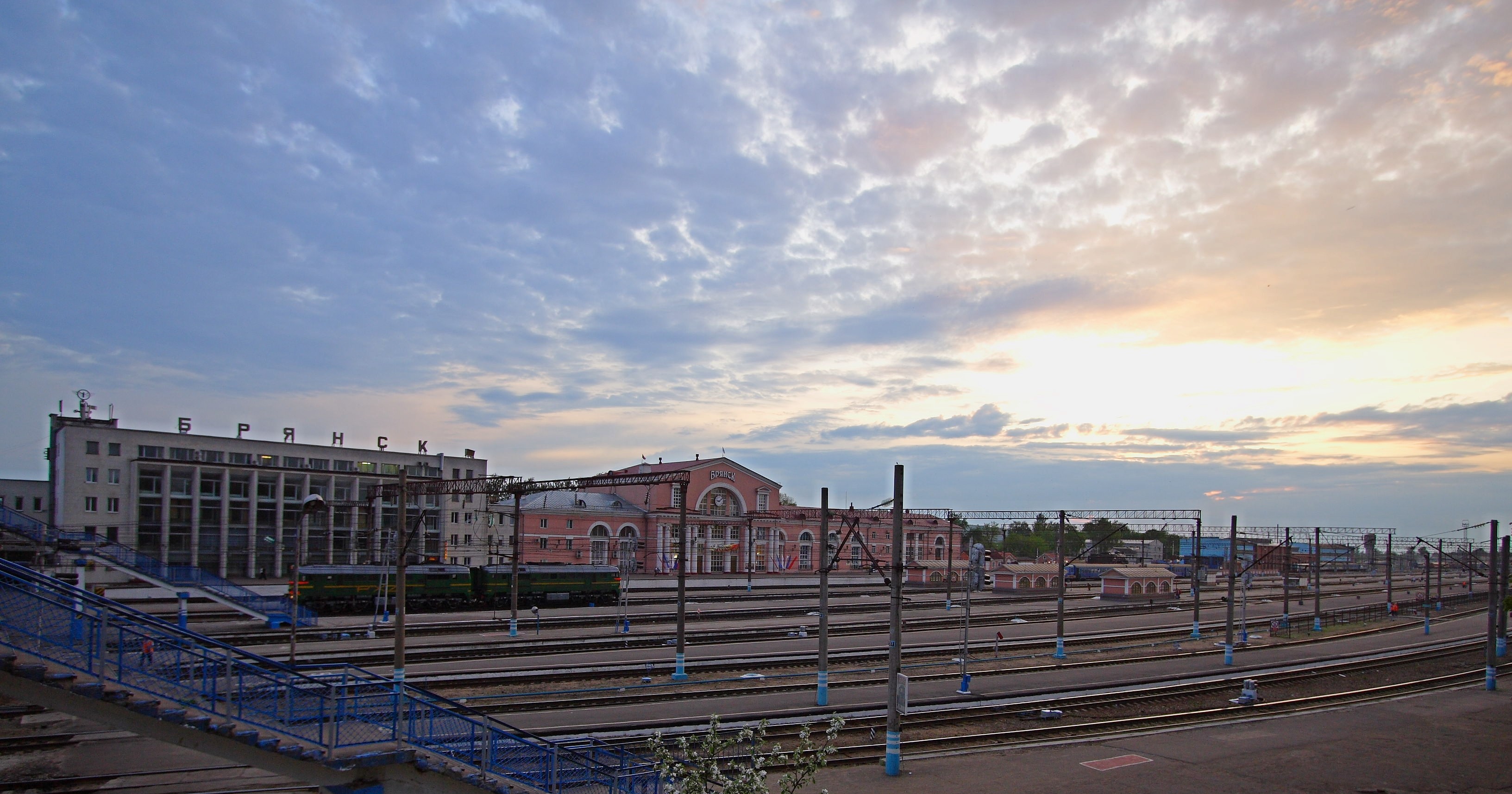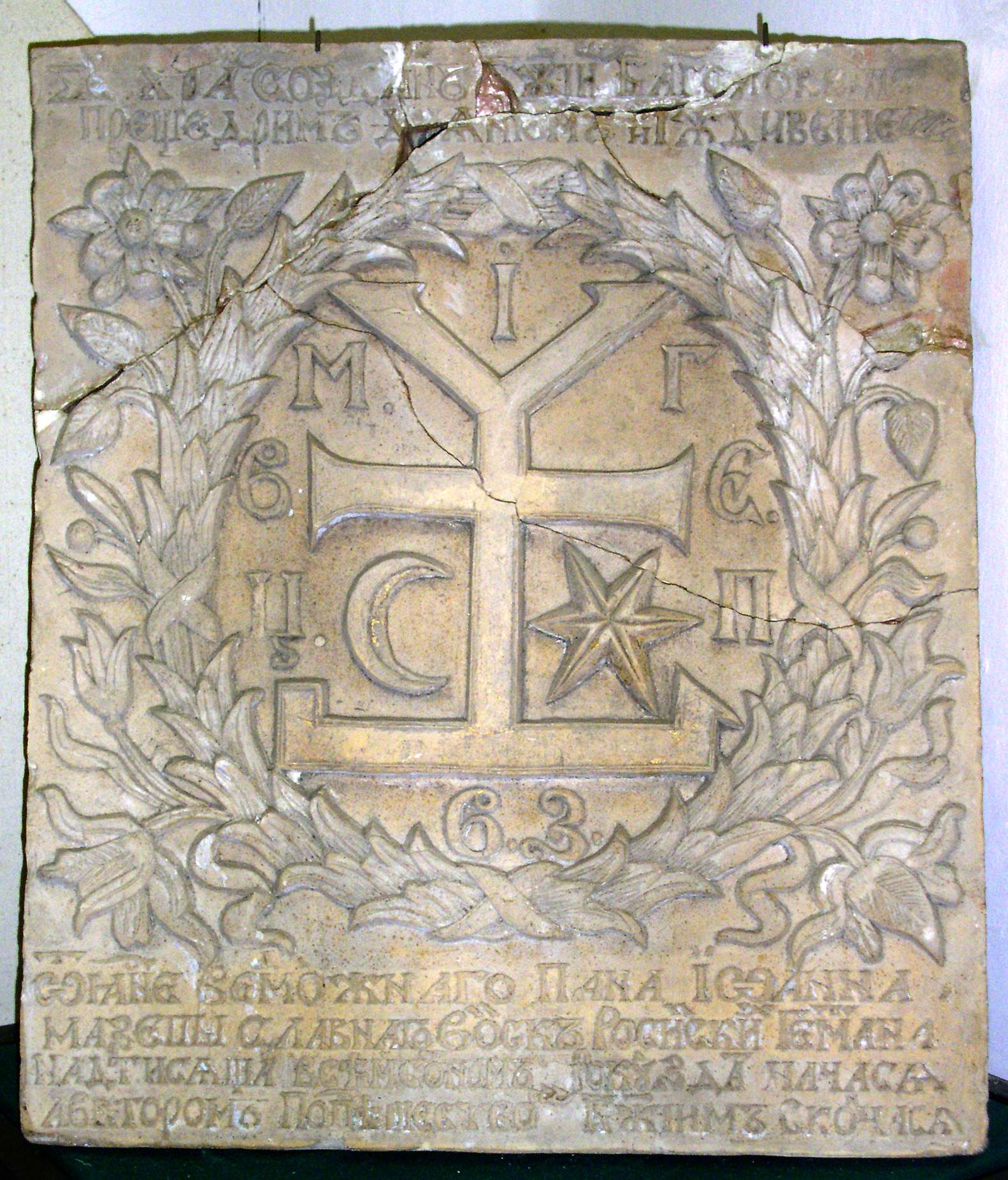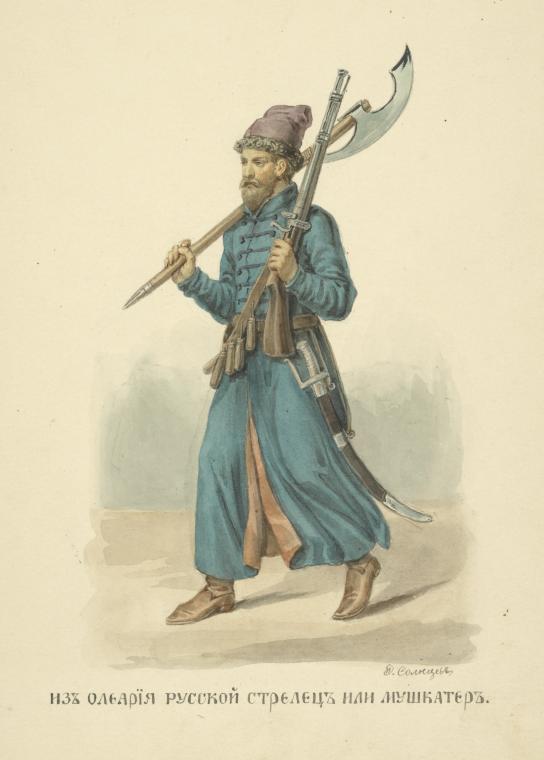|
Fyodor Shaklovity
Fyodor Leontyevich Shaklovity () (Bryansk - , Moscow) was a Russian diplomat best known as a staunch adherent of the regent Sophia Alekseyevna, who had promoted him from a regular scrivener to a member of the Boyar Duma and okolnichy. Fyodor Shaklovity was then appointed head of the Streltsy Department after the execution of Ivan Khovansky in the aftermath of the Moscow Uprising of 1682. Fyodor Shaklovity is known to have been one of the foremost advisers of Sophia Alekseyevna in international affairs, along with Vasily Golitsyn. In 1688, he was sent to Malorossiya to seek participation of Hetman Mazepa's army in Russia's campaign against Turkey. Upon his return from this mission, Fyodor Shaklovity began to incite the Streltsy to come out against the young Peter Alexeyevich and Naryshkin family and demand Sophia Alekseyevna's coronation. His efforts turned out to be fruitless. Soon, Fyodor Shaklovity and his Streltsy accomplices were delivered to Peter Alexeyevich. After an offic ... [...More Info...] [...Related Items...] OR: [Wikipedia] [Google] [Baidu] |
Bryansk
Bryansk ( rus, Брянск, p=brʲansk) is a city and the administrative center of Bryansk Oblast, Russia, situated on the River Desna, southwest of Moscow. Population: Geography Urban layout The location of the settlement was originally associated with navigable river-routes and was located in the area of the Chashin Kurgan, where the fortress walls were erected. For reasons that have not yet been clarified, the city changed its location and by the middle of the 12th century had established itself on the steep slopes of the right bank of the Desna on Pokrovskaya Hill (russian: Покровская гора). The foundations of the future urban development of the city were laid even earlier, when around the city-fortress in the 17th century after the Time of Troubles of 1598-1613 on the coastal strip at the foot of the Bryansk fortress the posadskaya "Zatinnaya Sloboda" was upset, and on the upper plateau, between Verkhniy Sudok and White Kolodez - the "Streletskaya Sloboda". ... [...More Info...] [...Related Items...] OR: [Wikipedia] [Google] [Baidu] |
Ivan Mazepa
Ivan Stepanovych Mazepa (also spelled Mazeppa; uk, Іван Степанович Мазепа, pl, Jan Mazepa Kołodyński; ) was a Ukrainian military, political, and civic leader who served as the Hetman of Zaporizhian Host in 1687–1708. He was awarded a title of Prince of the Holy Roman Empire in 1707 for his efforts for the Holy League. The historical events of Mazepa's life have inspired many literary, artistic and musical works. He was famous as a patron of the arts. Mazepa played an important role in the Battle of Poltava (1709), where after learning that Tsar Peter I intended to relieve him as acting Hetman (military leader) of Zaporozhian Host (a Cossack state) and to replace him with Alexander Menshikov, he defected from his army and sided with King Charles XII of Sweden. The political consequences and interpretation of this defection have resonated in the national histories both of Russia and of Ukraine. The Russian Orthodox Church laid an anathema (excommunica ... [...More Info...] [...Related Items...] OR: [Wikipedia] [Google] [Baidu] |
1689 Deaths
Events January–March * January 22 (January 12, 1688 O.S.) – Glorious Revolution in England: The Convention Parliament is convened to determine if King James II of England, the last Roman Catholic British monarch, vacated the throne when he fled to France, at the end of 1688. The settlement of this is agreed on 8 February. * January 30 – The first performance of the opera '' Henrico Leone'' composed by Agostino Steffani takes place in Hannover to inaugurate the new royal theatre in the Leineschloss. * February 23 (February 13, 1688 O.S.) – William III and Mary II are proclaimed co-rulers of England, Scotland and Ireland. * March 2 – Nine Years' War: As French forces leave, they set fire to Heidelberg Castle, and the nearby town of Heidelberg. * March 22 (March 12 O.S.) – Start of the Williamite War in Ireland: The deposed James II of England lands with 6,000 French soldiers in Ireland, where there is a Catholic majority, ho ... [...More Info...] [...Related Items...] OR: [Wikipedia] [Google] [Baidu] |
Year Of Birth Unknown
A year or annus is the orbital period of a planetary body, for example, the Earth, moving in its orbit around the Sun. Due to the Earth's axial tilt, the course of a year sees the passing of the seasons, marked by change in weather, the hours of daylight, and, consequently, vegetation and soil fertility. In temperate and subpolar regions around the planet, four seasons are generally recognized: spring, summer, autumn and winter. In tropical and subtropical regions, several geographical sectors do not present defined seasons; but in the seasonal tropics, the annual wet and dry seasons are recognized and tracked. A calendar year is an approximation of the number of days of the Earth's orbital period, as counted in a given calendar. The Gregorian calendar, or modern calendar, presents its calendar year to be either a common year of 365 days or a leap year of 366 days, as do the Julian calendars. For the Gregorian calendar, the average length of the calendar year ( ... [...More Info...] [...Related Items...] OR: [Wikipedia] [Google] [Baidu] |
Tsardom Of Russia People
Tsar ( or ), also spelled ''czar'', ''tzar'', or ''csar'', is a title used by East and South Slavic monarchs. The term is derived from the Latin word ''caesar'', which was intended to mean "emperor" in the European medieval sense of the term—a ruler with the same rank as a Roman emperor, holding it by the approval of another emperor or a supreme ecclesiastical official (the Pope or the Ecumenical Patriarch)—but was usually considered by western Europeans to be equivalent to "king". It lends its name to a system of government, tsarist autocracy or tsarism. "Tsar" and its variants were the official titles of the following states: * Bulgarian Empire (First Bulgarian Empire in 681–1018, Second Bulgarian Empire in 1185–1396), and also used in Tsardom of Bulgaria, in 1908–1946 * Serbian Empire, in 1346–1371 * Tsardom of Russia, in 1547–1721 (replaced in 1721 by ''imperator'' in Russian Empire, but still remaining in use, also officially in relation to several regi ... [...More Info...] [...Related Items...] OR: [Wikipedia] [Google] [Baidu] |
17th-century Russian Diplomats
The 17th century lasted from January 1, 1601 ( MDCI), to December 31, 1700 ( MDCC). It falls into the early modern period of Europe and in that continent (whose impact on the world was increasing) was characterized by the Baroque cultural movement, the latter part of the Spanish Golden Age, the Dutch Golden Age, the French ''Grand Siècle'' dominated by Louis XIV, the Scientific Revolution, the world's first public company and megacorporation known as the Dutch East India Company, and according to some historians, the General Crisis. From the mid-17th century, European politics were increasingly dominated by the Kingdom of France of Louis XIV, where royal power was solidified domestically in the civil war of the Fronde. The semi-feudal territorial French nobility was weakened and subjugated to the power of an absolute monarchy through the reinvention of the Palace of Versailles from a hunting lodge to a gilded prison, in which a greatly expanded royal court could be more easily ke ... [...More Info...] [...Related Items...] OR: [Wikipedia] [Google] [Baidu] |
Khovanshchina
''Khovanshchina'' ( rus, Хованщина, , xɐˈvanʲɕːɪnə, Ru-Khovanshchina_version.ogg, sometimes rendered ''The Khovansky Affair'') is an opera (subtitled a 'national music drama') in five acts by Modest Mussorgsky. The work was written between 1872 and 1880 in St. Petersburg, Russia. The composer wrote the libretto based on historical sources. The opera was almost finished in piano score when the composer died in 1881, but the orchestration was almost entirely lacking. Like Mussorgsky's earlier ''Boris Godunov'', ''Khovanshchina'' deals with an episode in Russian history, first brought to the composer's attention by his friend the critic Vladimir Stasov. It concerns the rebellion of Prince Ivan Khovansky, the Old Believers, and the Muscovite Streltsy against the regent Sofia Alekseyevna and the two young Tsars Peter the Great and Ivan V, who were attempting to institute Westernizing reforms in Russia. Khovansky had helped to foment the Moscow Uprising of 1682, which ... [...More Info...] [...Related Items...] OR: [Wikipedia] [Google] [Baidu] |
Modest Mussorgsky
Modest Petrovich Mussorgsky ( rus, link=no, Модест Петрович Мусоргский, Modest Petrovich Musorgsky , mɐˈdɛst pʲɪˈtrovʲɪtɕ ˈmusərkskʲɪj, Ru-Modest Petrovich Mussorgsky version.ogg; – ) was a Russian composer, one of the group known as " The Five". He was an innovator of Russian music in the Romantic period. He strove to achieve a uniquely Russian musical identity, often in deliberate defiance of the established conventions of Western music. Many of his works were inspired by Russian history, Russian folklore, and other national themes. Such works include the opera '' Boris Godunov'', the orchestral tone poem ''Night on Bald Mountain'' and the piano suite ''Pictures at an Exhibition''. For many years, Mussorgsky's works were mainly known in versions revised or completed by other composers. Many of his most important compositions have posthumously come into their own in their original forms, and some of the original scores are now also ava ... [...More Info...] [...Related Items...] OR: [Wikipedia] [Google] [Baidu] |
Naryshkin Family
The House of Naryshkin (russian: Нарышкины) is a noble Moscow boyar family of Crimean Tatar descent, going back to a certain Mordko Kurbat Naryshko, a Crimean Tatar, who moved to Moscow in the 15th century.Sergei O. Prokofieff, ''The Spiritual Origins of Eastern Europe and the Future Mysteries of the Holy Grail'', Temple Lodge Publishing (1993), p. 460 It became allied to the ruling house in 1671 when the great beauty Natalya Naryshkina (daughter of Kirill Poluektovich Naryshkin) married Alexis of Russia, later becoming the mother of Peter the Great. The Naryshkin family was persecuted under the regency of Tsarevna Sophia Alekseyevna of Russia, but were then highly favoured by Peter and his descendants and played a major part in Russian life. Streltsy revolt against Naryshkin family During the Streltsy uprising, soldiers of the Streltsy staged a revolt against the Naryshkin family (the relatives of Peter’s mother, who had assumed actual power). Their uprising was cr ... [...More Info...] [...Related Items...] OR: [Wikipedia] [Google] [Baidu] |
Peter The Great
Peter I ( – ), most commonly known as Peter the Great,) or Pyotr Alekséyevich ( rus, Пётр Алексе́евич, p=ˈpʲɵtr ɐlʲɪˈksʲejɪvʲɪtɕ, , group=pron was a Russian monarch who ruled the Tsardom of Russia from to 1721 and subsequently the Russian Empire until his death in 1725, jointly ruling with his elder half-brother, Ivan V until 1696. He is primarily credited with the modernisation of the country, transforming it into a European power. Through a number of successful wars, he captured ports at Azov and the Baltic Sea, laying the groundwork for the Imperial Russian Navy, ending uncontested Swedish supremacy in the Baltic and beginning the Tsardom's expansion into a much larger empire that became a major European power. He led a cultural revolution that replaced some of the traditionalist and medieval social and political systems with ones that were modern, scientific, Westernised and based on the Enlightenment. Peter's reforms had a lasting ... [...More Info...] [...Related Items...] OR: [Wikipedia] [Google] [Baidu] |
Streltsy
, image = 01 106 Book illustrations of Historical description of the clothes and weapons of Russian troops.jpg , image_size = , alt = , caption = , dates = 1550–1720 , disbanded = , country = Tsardom of Russia , allegiance = Streltsy Department , branch = , type = Infantry , role = , size = , command_structure = Russian Army , garrison = Moscow , garrison_label = , nickname = , patron = Saint George , motto = , colors = , colors_label = , march = , mascot = , anniversaries = , equipment = , equipment_label = , battles = Siege of KazanLivonian WarBattle of MolodiPolish–Muscovite War (1605–1618)Smolensk WarRusso-Polish War (1654–1667)Great Northern War , battles_label = , decorations = , battle_honours = , battle_honours_label = , flying_hours = , website = , current_commander = , commander1 = , commander1_label = , commander2 = , commander2_label = , commander3 = , commander3_label = , commander4 = , commander4_label = , comman ... [...More Info...] [...Related Items...] OR: [Wikipedia] [Google] [Baidu] |
Turkey
Turkey ( tr, Türkiye ), officially the Republic of Türkiye ( tr, Türkiye Cumhuriyeti, links=no ), is a list of transcontinental countries, transcontinental country located mainly on the Anatolia, Anatolian Peninsula in Western Asia, with a East Thrace, small portion on the Balkans, Balkan Peninsula in Southeast Europe. It shares borders with the Black Sea to the north; Georgia (country), Georgia to the northeast; Armenia, Azerbaijan, and Iran to the east; Iraq to the southeast; Syria and the Mediterranean Sea to the south; the Aegean Sea to the west; and Greece and Bulgaria to the northwest. Cyprus is located off the south coast. Turkish people, Turks form the vast majority of the nation's population and Kurds are the largest minority. Ankara is Turkey's capital, while Istanbul is its list of largest cities and towns in Turkey, largest city and financial centre. One of the world's earliest permanently Settler, settled regions, present-day Turkey was home to important Neol ... [...More Info...] [...Related Items...] OR: [Wikipedia] [Google] [Baidu] |








.jpg)

